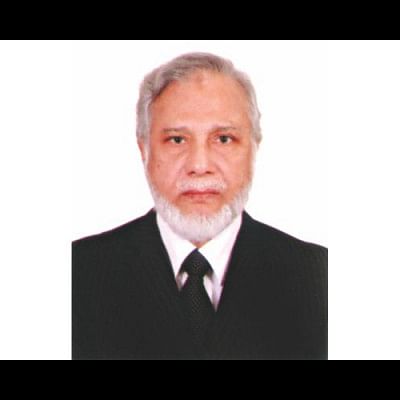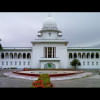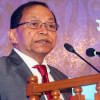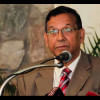I think he did not do it right

Some of the observations in the 16th amendment verdict may have been given “out of antipathy” towards the government and parliament although judges are bound by oath not to do anything out of antipathy or affection, Law Commission Chairman Justice ABM Khairul Haque said yesterday.
“If you [journalists] and the people of the country think that his [chief justice] speech [observations], which was uncalled for, stemmed from antipathy, then think about the fate of the judgment,” said Khairul, who was chief justice from September 2010-May 2011.
He was speaking at a discussion titled “National Mourning Day, 16th Amendment and Sheikh Hasina's Politics of Development” at the city's Cirdap auditorium.
Bangladesh Heritage Foundation, a non-profit, organised the programme with its chairman Wali-ur Rahman in the chair.
At the programme, Food Minister Qamrul Islam, “If he [chief justice] is telling us now that appointments have been made on political considerations, then it must be told that he was himself appointed on political consideration in 1999.... He [chief justice] is acting as a toy of a lobby.”
The apex court on August 1 released the full text of its verdict that scrapped the 16th amendment, which had given parliament the power to remove SC judges for misconduct or incapacity.
On August 9, Khairul Haque strongly criticised the verdict terming it “misconceived, irrelevant and immature”.
Ever since, he has become one of the most vocal critics of the judgment.
It is Justice Khairul-led Law Commission that in a report to the government in 2014 recommended restoring parliament's power to remove top court judges.
Later, the Commission drafted a law outlining the procedure of removal of SC judges and submitted it to the law ministry.
Yesterday, Justice Khairul said that under article 116 of the constitution, the law ministry dealt with the appointment, transfer and promotion of lower court judges in consultation of the Supreme Court.
“I personally think this system is good...and this system should continue,” he said.
But the chief justice in his observation said many things about the article, Khairul said, adding, “This was beyond the issue at hand and beyond the ambit of his judgment. I think he did not do it right.”
He claimed that Surendra Kumar Sinha, the incumbent CJ, made various comments about parliament and “did vilification which at least shows bad taste if not anything else.”
Members of parliament are representatives of the people, which is their most important quality, he maintained.
“It is not necessary for all the MPs to have PhD degrees. By the way, several of them [MPs of BD] have PhDs. It is true that you would not find such educated people all the time even in the UK and the US. It may surprise you but it is a fact,” he claimed.
“Educational qualification can't be the criteria to be an MP or a member of congress,” he said.
“Here [in the judgment], the chief justice termed parliament immature. It is shocking,” he added.
“He [Sinha] said democracy is immature. Why immature?” said the Law Commission chief, his voice rising. “Because, we have made arrangement for the election of women under article 65 (3) and that's why democracy is immature. What kind of tomfoolery is this? Who is he [Sinha] to say this?
“Not the judiciary, only the elected members [of parliament] can decide what is good for the country and what is not good for the country. It is certainly not for the judges to say. Not for any other reasons, simply because they [judges] are not elected.”
Justice Khairul said the CJ in the verdict mentioned that 152 MPs have not even been properly elected.
“Then, are they [judges] elected? At one point, he [CJ] said parliament did not carry out our [SC] directives. This is not proper. The Supreme Court does not have any right to give directives to parliament. And if the Supreme Court does give parliament any directives, the House is not bound to carry them out, because parliament is sovereign.
“He [CJ] said the most objectionable statement by saying that parliament is dysfunctional. This can't be the language of any judge, judiciary or the Supreme Court,” said Khairul.
SC judges take oath that they would not do anything out of antipathy or affection. “But the things that I just told you [from the observations] spell out antipathy, if not affection....
“But if any verdict reflects antipathy or affection then what would be the fate of that judgment. Think about it. I have nothing to say,” he added.
“If you think what I have just mentioned [from the observations] -- 'parliament is immature,' 'democracy is immature,' 'parliament does not pay heed to our directives,' 'pseudo democracy,' 'parliament dysfunctional' -- fall under the definition of antipathy or affection, then what would be the position of the judge?”
About the criticism whether he, being chairman of the Law Commission, can criticise the Supreme Court verdict, Khairul said it was the Commission's job to monitor laws and point out any flaws in them.
The judgment of the Supreme Court is also a law and as the chairman of the Commission, it is his duty to talk about the verdict, like it or not, he said.
He said many of his friends told him that although he (Khairul) was criticising the verdict, eight amicus curiae, who are very learned persons, spoke in favour of scrapping of the 16th amendment.
“I told them [his friends] and now I want to tell you that those who appeared as amicus curiae are very learned persons, there is no doubt it. They practise at the Supreme Court and it is expected that they earn tonnes of money from there,” he said.
Then he recalled what a senior lawyer told him when he was a young lawyer some 48 years ago.
“He [my senior] told me: 'Khairul, if you want to please a certain God, recite the mantra that the certain God likes to hear the most.' I think you got my point. I have nothing to say about the amicus curiae,” he said.

 For all latest news, follow The Daily Star's Google News channel.
For all latest news, follow The Daily Star's Google News channel. 








Comments